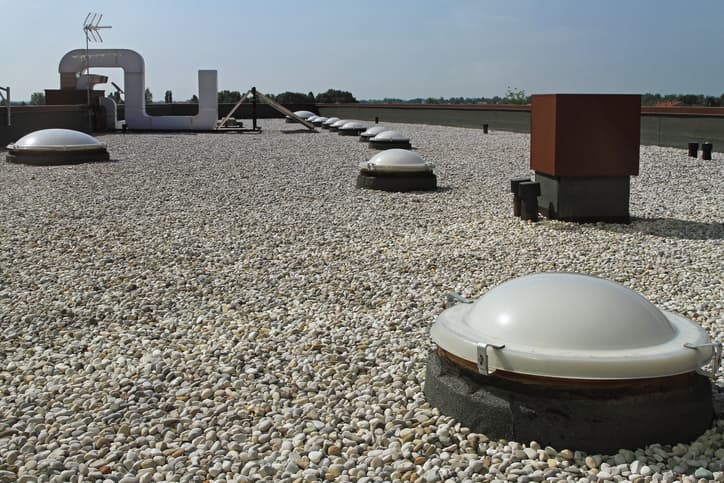PVC roofing: Pliability, durability, and recyclability
An increasingly popular roofing material for commercial applications, PVC membrane roofs—when properly installed—provide facilities with durability, strength and energy efficiency. PVC roofing gets its name from the thermoplastic material from which it is made—polyvinyl chloride. PVC roofing sheets are inherently flexible, yet strong and puncture resistant.
Whether you’re looking to repair your existing PVC roofing or are considering it for a brand new facility, here’s what you need to know about PVC membrane roofs:
- Durability and strength
PVC membrane roofing is known for its durability and strength. Notably, PVC roofing sheets are perfect for high traffic commercial low slope or flat roofs, as the material remains puncture resistant and flexible, even in the most extreme temperatures. And, because the seams are secured through heat-welding, PVC membrane roofs are highly resistant to leaks. - Proper installation techniques
PVC roofing comes in manufactured sheets, usually ranging from 6 to 12 feet wide. Before applying PVC roofing sheets, your roofing contractor will install underlayment to the roofing deck. Or, some PVC membrane roofs come with a fleece backing, reducing installation time. There are three main techniques for installing PVC roofing sheets: fully-adhered installation, mechanically fastening the sheets, or ballasting them with rocks. Regardless of the technique used, your PVC roofing should be fastened tightly at all perimeters to prevent the membrane from pulling away from the edges during high wind conditions.

Your licensed roofing contractor will guide you toward the best PVC roofing installation technique for your facility, and can also help you navigate fire safety, building codes, and international standards. - Green building considerations
Sustainability is key for commercial projects these days, and the big certification you need to get in order for your building to be considered ”sustainable” is the LEED v4 certification, which is more focused on the use of recyclable, sustainable materials than previous LEED iterations.PVC roofing can easily contribute toward your LEED v4 certification, as PVC roofing sheets can be made with recyclable materials, and can often be recycled at the end of its service life. Additionally, the white and gray varieties of PVC membrane roofing are UV and temperature resistant, which can contribute to the overall energy efficiency rating of your facility. Also important, the temperature control provided to your facility by PVC roofing can lower your utility bills.
Before starting your next commercial roofing project, you need to schedule a consultation with Wildwood Roofing & Construction. Here’s what sets us apart:
We know our stuff. We stay ahead of the curve, and can guide you toward energy efficiency certifications such as LEED v4, as well as ensure that your building is up to fire and safety codes. Our skilled roofing technicians are trained in the proper installation technique for every slope, material, and weather condition. Whatever your roofing needs, we’ve got your facility covered.
We hold ourselves to a higher standard. When we give you an estimate, we stick to it. When we give you a timeline, we stick to it. Roofing is our passion, and we aim to do it right. Every time. There’s a reason why our past clients recommend us and why we’re proud of every roofing project we’ve ever completed.
Schedule a risk-free consultation today and learn why we’re trusted throughout St. Louis for commercial roofing projects.

